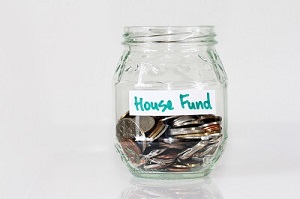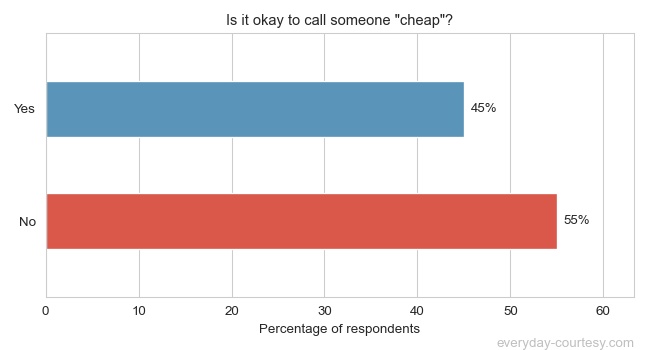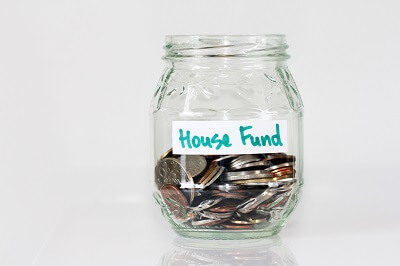Do you have a friend, or relative, who is just plain . . . cheap? We all know frugal people, but that is a different situation. “Frugal” is usually a person who spends sparingly or is careful to observe economies.

But should you tell someone directly that they are cheap?
“Cheap” has a negative connotation, so it is impolite to point this out to someone. The persons concerned usually know this very well themselves. Therefore, it is more important to clarify when such a person is expected to make a monetary contribution and how much it will be.
Our Survey
To find out what people think about calling someone cheap, we surveyed 105 people in the United States. The majority of the panel consisted of younger people between the ages of 25-35.
45% of respondents think it’s okay to call someone cheap, while 55% think it’s rude.

While the majority of people agree that yes, it is rude to call someone cheap, it’s not a big majority.
People have many facets, and the fact that some of them are cheap doesn’t mean they are bad people. They just have an aspect of their personality that is different from our values. We certainly have a couple of those people in our lives, and here is how we deal with it.
Don’t Call Them Out
For starters, we don’t call them out on being cheap.
They know they are cheap.
They probably came to be that way through their parents, who may have lived through hard times. They themselves may have known financial difficulties. It won’t help your relationship with the person to say, “You’re cheap!” So, don’t do that.
It’s rude and unhelpful and may just make them defensive and damage the relationship.
Clear Expectations
We have found to deal with our “cheap people” to set very clear expectations. A situation that comes up frequently is the out-to-dinner scenario. The cheap person will be upset by pooling the bill and tip. They’d prefer to have their own tab and order an appetizer.
Set the expectation by saying:
“We are having dinner at xyz Restaurant; we will be pooling the bill and tip for convenience and per the restaurant’s request.”
That makes the plan clear.
If the cheap friend is dismayed by that situation, they can decline. If they decide to go, they know the plan, and that’s that.
If they complain, calmly say:
“This was the plan; if you preferred not to do this, you probably should have declined.”
Another situation is the office birthday pool. It’s not fair for one person to put in $10 and the cheap person to put in $1, but both sign the birthday card equally.
This can be solved by saying:
“We are getting birthday treats for Jessica; if you would like to chip in, it’s $5 for each person.”
Then, if they would rather not chip in, it is their choice — but they should not get to sign the card.
And who hasn’t been out for drinks, and taken turns buying rounds . . . and then the cheap person leaves . . . after having enjoyed several free drinks.
This can be avoided by saying:
“We’re getting together for drinks – Larry is getting round 1; I’ll get 2; you can get 3.”
We have also run into this situation for wedding gifts. If you volunteer to pick up the gift, and then all contribute, be very clear what the cost will be (including tax, wrapping paper, and card) and say:
“The gift comes to $15 from each of us. Please get your share to me by _________.”
If they decide that’s too much, well, they are on their own for a gift.
The trick is to be clear and communicate.
Don’t Be Co-Dependent
A situation we have come upon with cheap friends is that you sometimes feel bad for them — maybe you know why they are cheap and feel compelled to help them out. You may find yourself picking up the tab, or including their names on gift cards, or picking up that small thing they need at the store on your own dime.
Don’t be co-dependent. It will ruin your relationship with them.
After a while, the resentment will build up. You may see that they have a bigger bank account or they may purchase something significant (house, car) and leave you wondering what on earth happened.
Some cheap people are terrible tippers, for example, but have lovely homes. It’s not up to you to subsidize their standard of living.
Don’t Be Rude
If you lower yourself to saying something rude, you are being rude, yourself. You will feel bad about what you have said. So what do you do? How do you handle the cheap person without saying, “You’re cheap”?
1. Avoid Certain Situations
If your cheap friend or relative repeatedly embarrasses or upsets you in restaurants, well, avoid going to restaurants with them. If they ask why calmly explain.
2. Don’t Volunteer to Handle Things
Whether it’s gift-buying, chipping in on office parties, going out for drinks, whatever . . . if you know Mr. or Mrs. Cheap is going to be problematic, don’t volunteer to handle it. If experience hasn’t taught you, by now, to stop helping them, it’s on you, not them.
3. Be Direct, Not Confrontational
Being direct is, for example, saying, “Each person’s share is $5.” Being confrontational is saying, “I know you hate to spend any money, but we all chipped in $5, so why can’t you?”
4. Be Compassionate
If there is truly a sad reason why the person is cheap, it may just not be something they can get over easily. Some cheapness is actually a trait of Obsessive-Compulsive Disorder and unless you are a trained counselor, you can’t fix that.
They may find themselves being left out of things and that’s sad. It might be time, should they ask why, for a direct conversation.
If so, you can gently explain that their “cheapness” is causing them to be left out of parties because it makes people angry or irritated to have to deal with it. They may see and understand; they may not.
5. Look for their Other Side
We like our cheap friends and relatives. Oddly, while they may hate to tip, or give to charity, they are very generous with their time. They have helped us with house projects, working on fixing our cars, or watching pets.
It is possible to still be helpful and not have it cost money. We have learned to find the humor in the situation and not get exasperated about the penny-pinching.

Matt Vargas is an author and public speaking coach with a degree in sociology and more than ten years of practical experience. Matt is responsible for the empirical surveys at everyday-courtesy.com, is a passionate recreational musician, and blogs here about his experiences in the field of interpersonal communication.

